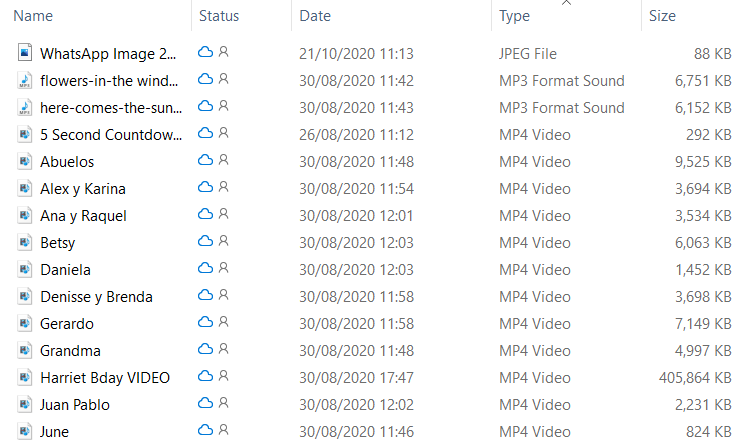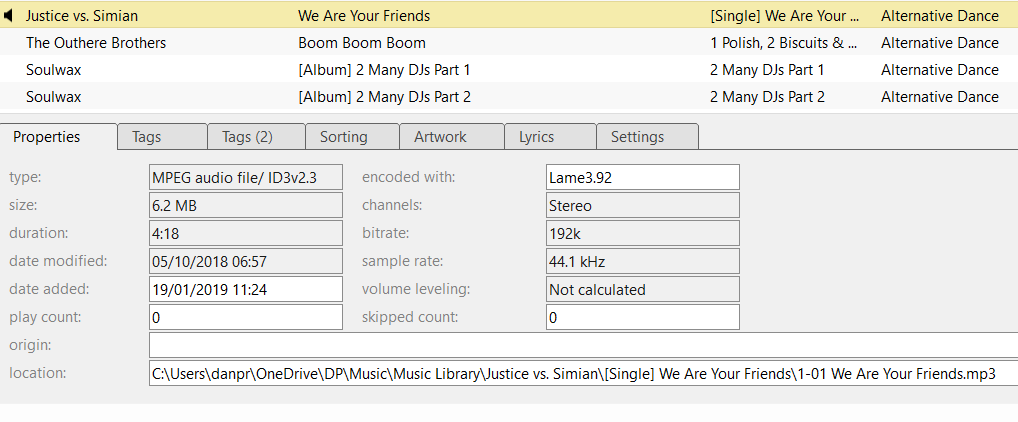What Is The Difference Between Download And Upload
MP4 files are simply a newer and better version of MP3 files, right?
Well, no.
That single-digit difference might give the impression that they are more-or-less the aforementioned thing, but nil could exist farther from the truth. They each have distinct uses, histories, and advantages; MP3 and MP4 are not two editions of the same affair.
In this article, nosotros'll explain some of the key differences that everyone should know about. By the time you've finished reading, you'll know exactly which file type is right for your needs.
Understanding MPEG
Just earlier we swoop into the differences, information technology's of import to empathize where the two file types originated.
MP3 is short for MPEG-one Audio Layer iii. It was 1 of ii formats that were considered for the MPEG audio standard back in the early-1990s. Electronics firm Philips, French research institute CCETT, and Deutschland's Institute for Broadcast Technology backed the format thanks to its simplicity, lack of errors, and computational efficiency.
The decision was reached in 1991, and MP3 files entered the public domain in 1993.
MP4 stands for MPEG-iv Office fourteen. This engineering science is based on Apple's QuickTime MOV format only adds back up for diverse other MPEG features. The file type was showtime released in 2001, but information technology's the 2003 re-release that's now usually used when you see MP4 files. There have been no further updates to the format since 2003.
The nearly key difference between MP3 and MP4 is the blazon of data they shop.
MP3 files can but be used for sound, whereas MP4 files can store sound, video, nonetheless images, subtitles, and text. In technical terms, MP3 is an "audio coding" format while MP4 is a "digital multimedia container" format.
MP3: The Rex of Audio
Because they are so good at storing audio, MP3 files have get the de facto standard audio format for music software, digital audio players, and music streaming sites. No affair which operating system or device y'all own, yous tin can be confident MP3s will work right out of the box without a hitch. It's why MP3 players might yet be worth buying.
The master reason they're so popular is the way the file type works. MP3s use lossy compression, which vastly reduces the size of an audio file while barely affecting its quality. The procedure works by stripping out all the data across the average person's hearing range, and so compressing the rest as efficiently as possible.
MP3s besides allows users to residuum the trade-off between audio quality and file size. If you're an audiophile, y'all tin opt for larger file sizes with higher bitrates and better audio quality. On the other hand, if y'all want to squeeze every bit much music as possible onto your portable device, you tin can reduce the file size and audio quality accordingly.
Furthermore, MP3s will always be smaller than equivalent MP4 files. Then, if your audio actor or smartphone is getting full, you should convert any audio saved as MP4 into MP3 format. Note that y'all may take a hitting to sound quality in the process!
MP4: More Uses, More Flexibility

MP4 files are "containers"—instead of storing the lawmaking for the file, they store the data. Every bit such, MP4 files do non take a native manner of handling the coding of the file. To determine how the coding and compression will exist handled, they rely on specific codecs.
There are hundreds of codecs out at that place today, but not many will work with mainstream MP4 players. In order for a histrion to be able to read and play an MP4 file, it must accept the same codec itself. The nigh widely-supported codecs are:
- Video—MPEG-4 Part ten (H.264) and MPEG-4 Role 2.
- Audio—AAC, ALS, SLS, TTSI, MP3, and ALAC.
- Subtitles—MPEG-4 Timed Text.
These codecs requite MP4s a lot more flexibility than MP3. For example, M4A files (which are MP4 files that only contain audio) can handle both Advanced Sound Coding (AAC) and Apple Lossless Audio Coding (ALAC). The selection of quality resides with the user. Either way, the file volition announced equally an MP4 file, but the data within the file volition differ vastly.
As well audio, MP4 files can as well comprise video, images, and text. You'll often see various file extensions that give an indication of the type of information within the container. Hither are some of the most mutual:
- MP4—The simply official extension.
- M4A—Non-protected audio.
- M4P—Audio encrypted past FairPlay Digital Rights Management.
- M4B—Audiobooks and podcasts.
- M4V—MPEG-4 Visual bitstreams.

Both MP3 and MP4 files support metadata. Without it, it would be incommunicable to effectively utilise music player apps (similar iTunes) or home media servers (like Plex).
MP3 files use ID3 tags. They allow information such as song title, artist, anthology, runway number, and fifty-fifty album artwork to be stored within the file itself. The tags are saved at the finish of the file's code—their content is either extracted past decoders or ignored equally junk non-MP3 data. You tin can edit these tags using the popular Mp3tag.
Other pertinent data, such as ReplayGain information or DRM restrictions, can also be saved inside the metadata.
MP4 files can implement metadata in the same manner as MP3s, just they also introduce the Extensible Metadata Platform (XMP). XMP metadata is well-suited for MP4'south container format thanks to its compatibility with a vast number of file types, including PDF, JPEG, GIF, PNG, HTML, TIFF, Adobe Illustrator, PSD, WAV, and PostScript.
MP3 and MP4 in a Nutshell
We've tried to give yous a counterbalanced insight into the two file types without existence likewise technical, and nosotros hope yous've now got a clearer agreement of the two formats.
In summary, if y'all're saving audio for use on portable players, you should look to MP3. If you want to save video, or you want to stream your content over the internet, y'all should apply MP4. MP4 does work for audio files, simply it is not the most optimal solution.
Image Credit: Antonio Guillem via Shutterstock
Originally written past Mike Fagan on December viii, 2009
Well-nigh The AuthorSource: https://www.makeuseof.com/tag/technology-explained-what-is-the-difference-between-mp3-mp4/
Posted by: southwellpetry1994.blogspot.com



0 Response to "What Is The Difference Between Download And Upload"
Post a Comment